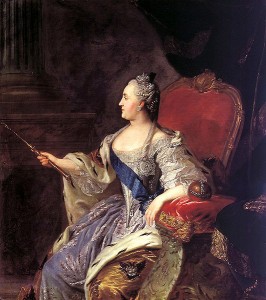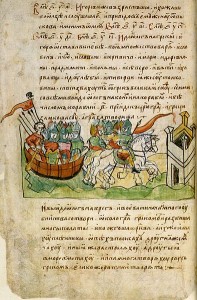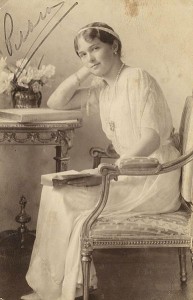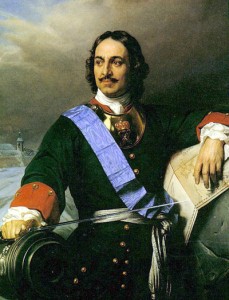On this day in 1796, Catherine the Great (aka Catherine II) passed away in her commode (Episode 51) at the age of 67. She was considered, along with Peter the Great, as one of the greatest leaders of the Russian Empire. Her son Paul I was to take over and reign for a little over four years. Paul despised his mother and did much to reverse many of her policies. He put into law that only male heirs to the throne were eligible setting up the way for the decline of the Romanov dynasty.
She was the wife of Peter III and upon his murder during a coup d’etat on July 16, 1762, she took control of the government. Born, Sophie Friederike Auguste von Anhalt-Zerbst-Dornburg, she was hand-picked by Empress Elizabeth (Episodes 40 and 41) the daughter of Peter the Great. The marriage was a disaster and likely was never consummated. Fearing that she would be sent to a nunnery and divorced, she decided along with her friends the Orlov brothers, to stage the overthrow. What helped her was the fact that Peter III was generally disliked and had sided with the Prussians during the wars going on at the time.
The era of Catherine’s reign is generally considered the Golden Age of the Russian Empire although the vast majority of the people living in Russia at the time were incredibly impoverished. It was also the time of one of the greatest revolts in Russian history, the Pugachev Rebellion (Episode 47).
Her time as Empress of all of Russia was a time of great expansion and a instilling more European style into Russian society. Catherine was one of the few Russian leaders (post Peter the Great) to have no direct heritage to previous rulers (Catherine I was the other). She was also a great patron of the arts and commissioned the building of the Smolny Institute the only school of higher learning for women in Russia.






Welcome to the Russian Rulers History Blog Site!!!
Welcome to all my loyal listeners and those who haven’t yet listened to my podcast, Russian Rulers History. I started this journey in April of 2010 and have gone way beyond where I thought it would be. Back then I thought I would get through Russian history in just 50-60 episodes but it is already over 100 strong.
Instead of ending the podcast with Vladimir Putin, I will extend things well beyond that as I will leave the rulers and start concentrating on events and people who contributed to the glorious history of Russia. Join me here and at my podcast site which you can reach here, or you can join our growing group on Facebook at the Russian Rulers History Podcast group.